Practitioners say traditional Chinese medicine has a part to play amid the COVID-19 pandemic. Dara Wang reports.
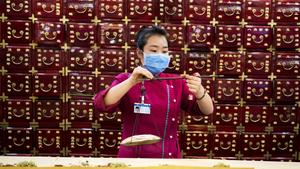 The school’s medicine package includes Codonopsis pilosula, Lonicera japonica and Forsythia suspensa that are effective in improving digestive system functions or immunity. (PHOTO PROVIDED TO CHINA DAILY)
The school’s medicine package includes Codonopsis pilosula, Lonicera japonica and Forsythia suspensa that are effective in improving digestive system functions or immunity. (PHOTO PROVIDED TO CHINA DAILY)
Traditional Chinese medicine (TCM) practitioners say their ancient arts have a role to play in helping the elderly live through the COVID-19 pandemic. And through their efforts and the efforts of universities and charities, packages of TCM medications are being handed out to one of the city’s most vulnerable populations — the elderly.
Since February, the School of Chinese Medicine of Hong Kong Baptist University (HKBU) has given away free Chinese medicine at their clinics and at eldercare facilities. The specially prepared medications have a twofold purpose, to fortify the body’s immune system and to uplift the spirits, giving a sense of optimism and self-confidence.
The school does something like this every year, during flu season — giving out medicines free of charge to patients over 65.
Chair Professor and Director of the Clinical Division at the School of Chinese Medicine of HKBU Bian Zhaoxiang and his team tailor-made this year’s preparation, focusing on tuning up the immune system and fortifying a spirit of optimism.
In the first week of March, Cheung Chan-chu, 70, got one of the free packs from Lok Sin Tong, a charity group that has provided free medications since the early stage of its setup in the mid-1700s. “It was the first time I ever was given free Chinese medicine. The donation and the free delivery were heartwarming,” said Cheung.
The organization provided free burial services in the early days, and later expanded its benefits to medical, education, and welfare for the elderly.
Cheung said she knows of many others who have picked up HKBU’s Chinese medicine package since the Chinese New Year and recommended to their friends and families to get their own medications the same way. “Thanks to the medicine, we elderly people are feeling optimistic and no panic.” She noticed that ginseng is listed among the ingredients. “It is a kind of precious Chinese medicine and good for health,” Cheung said.
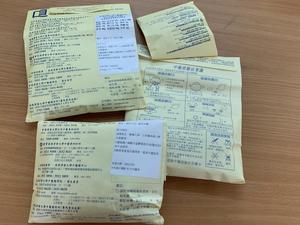 The package contains three doses. Each dose has 12 ingredients, weighing 130 grams. (PHOTO PROVIDED TO CHINA DAILY)
The package contains three doses. Each dose has 12 ingredients, weighing 130 grams. (PHOTO PROVIDED TO CHINA DAILY)
Cheung recognizes that TCM treatment is a gradual process, affecting the body slowly, at least when compared to Western medicine. She does not expect three doses of Chinese medicine will make her immune to the virus but she does believe it will make her stronger if she comes in contact with it. Cheung is out in the shops these days, buying the ingredients listed on the package the school sent. She’s making her own medicine and believes that it will make her stronger and help her avoid the disease.
Polly Seto Man-yee, unit-in-charge of Hong Kong Sheng Kung Hui’s Tai Wo Neighbourhood Elderly Centre, said many recipients told her the medicine is not as bitter as Chinese medicine usually is and that they are sleeping better these days.
The chairman of the Fong Shu Fook Tong Foundation and Fong’s Family Foundation, Henry Fong Yun-wah, donated HK$100,000 ($12,900) to help the school’s charitable effort, allowing more people to get the benefits.
Fong’s donation paid for more than 2,000 doses of Chinese medicine that were delivered free to hospitals and elderly community centers. More than 700 people are getting the benefits.
“I deeply appreciate the kindness and philanthropy of Fong, who always cares for vulnerable groups and always keeps his enthusiasm for helping charities,” said Bian. “This donation will improve the health of the elderly, but also help reduce panic by increasing confidence in the fight against the coronavirus.”
The school estimates that so far, more than 13,000 people have benefited from the free medicine delivery since the program started this year.
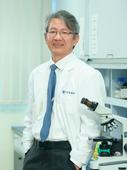 Bian Zhaoxiang, chair professor and director of the Clinical Division, School of Chinese Medicine of HKBU, expects TCM to play a bigger role in fighting the coronavirus. (PHOTO PROVIDED TO CHINA DAILY)
Bian Zhaoxiang, chair professor and director of the Clinical Division, School of Chinese Medicine of HKBU, expects TCM to play a bigger role in fighting the coronavirus. (PHOTO PROVIDED TO CHINA DAILY)
The TCM approach
Improving the physical fitness of susceptible people is an important mission of the school, Bian highlighted. In fighting the coronavirus, TCM is a significant weapon, especially by improving the body’s natural immunity, he said.
TCM has a history as old as Chinese culture. Its theory places particular emphasis on the mind, especially the inborn vitality of the patient, related Bian. While the natural sciences separate themselves from the religions, philosophies and other cultural disciplines of Western history, TCM theories integrate culture and religion as part of the whole, according to Qian Jia’s article, published by the World Health Organization (WHO).
It’s viewed as “wholeness” and thus has some considerations that go beyond Western medicine. “Its basic principles are hard to put under the microscope of evidence-based medicine of the present day,” the article stated.
WHO, in making primary healthcare a core policy, found that TCM’s values do address the health needs of a community.
The study claims that instead of suppressing individual symptoms, TCM looks at disease as a holistic issue and addresses the whole person. Its therapies focus on restoring the normal interaction between the human and human nature. Under TCM’s theory, the power of self-healing and immunity are core concepts; if health and immunity are maintained, the individual remains free of disease, and thus “health for all” is achievable, at least in theory.
Gastrointestinal symptoms like nausea and diarrhea are early clues of coronavirus infection. In TCM’s concept, these patients have dampness and deficiency of spleen. Some Chinese medicines are effective in removing dampness and boosting qi and thus lowering the risk of infections, said Bian.
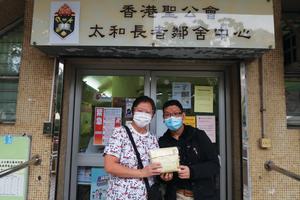 Senior residents receive free Chinese medications prepared by the School of Chinese Medicine of Hong Kong Baptist University. (PHOTO PROVIDED TO CHINA DAILY)
Senior residents receive free Chinese medications prepared by the School of Chinese Medicine of Hong Kong Baptist University. (PHOTO PROVIDED TO CHINA DAILY)
TCM theory is the theory of mind or vitality, attested by Huangdi Neijing, the greatest and oldest Chinese medical classic; it states that “patients with robust vitality will heal. Those who lack strong vitality are likely to die.” Qi refers to the natural energy of a man, a resource used for self-protection. Immunity pertains to the body’s biological defenses. If a person is lacking in qi, he or she will present only weak resistance to attacks from diseases.
Boosting qi shares something common with enhancing biological immunity.
The spleen, according to TCM practice, is responsible for the intake, the processing and distribution of nourishment from food. It turns digested food into nutrients and transports them to lungs, according to Eu Yan Sang, a TCM pharmaceutical company.
Dampness refers to a condition wherein the spleen is incapable of transporting and transforming body fluids. An accumulation of moisture within the body follows. It’s a condition that is considered turbid, heavy, and hard to shake off. The accumulation of dampness in the intestines causes loose stools, observes Bian. The medicine removes impediments to the functioning of the spleen, helping to restore healthy digestion.
Taking care of the elderly
The elderly already in precarious health are vulnerable to dying from the coronavirus. What makes that condition even worse is the old people are more susceptible to the virus. Our aging population puts a heavy burden on medical resources. It’s not just a problem in Hong Kong. Many other regions have similar challenges as more and more people enter their senior years.
It’s noted that many elderly folk are listed among confirmed cases of COVID-19. The natural immunity of elder people in general is much weaker than that of the youth. Those with other serious illnesses are more prone to complications from the virus, said Bian.
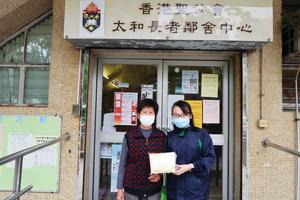 Senior residents receive free Chinese medications prepared by the School of Chinese Medicine of Hong Kong Baptist University. (PHOTO PROVIDED TO CHINA DAILY)
Senior residents receive free Chinese medications prepared by the School of Chinese Medicine of Hong Kong Baptist University. (PHOTO PROVIDED TO CHINA DAILY)
Aside from medications, Bian suggests elderly people get a therapeutic massage periodically or acupuncture. There are also exercises promoted by TCM. Regular care improves health, lowering the risk of infection and dying from the virus, said Bian. He expects that in the long term, the pandemic will raise awareness of the need for a healthy lifestyle throughout the community, especially among the senior groups.
Bian said the school has been getting positive feedback, with many recipients reporting they feel calmed by the TCM medications. He warned against overuse of them.
“We distribute medicine to elderly people with health problems only. Those in good health have no need to take our medicine,” Bian said.
In the light of modern science, TCM, which formed the basis of healthcare in ancient China, has taken a secondary role in the modern era. Scholars and practitioners hope that by providing benefits during the current pandemic, TCM may regain traction and earn greater trust in the community.
Bian hopes for increased international exchanges among TCM communities to explore new discoveries and treatment approaches to infections and to rehabilitation and expects greater convergence with Western medicine. He says novel approaches are especially important to regions facing an aging population.
“With more and more people realizing the importance of it, the systems of Western and Chinese medicine will be more integrated and improve our abilities and efficiencies for resisting diseases”, Bian suggested.
Unlike Western medicine, Chinese medicine rarely makes specific assertions about how long medications will be in effect. Most Chinese people believe TCM involves a gradual process. Practitioners and advocates believe it also will require a gradual process before TCM plays a larger role in the world of modern science.
Many practitioners are raising the profile of TCM during the current crisis, not only to help save lives, but to contribute to overall good health. Self-promotion is not the priority, but if the treatments help, the entire community will be the winner.
Contact the writer at dara@chinadailyhk.com



